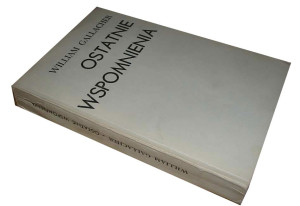
WILLIAM GALLACHER - OSTATNIE WSPOMNIENIA
Producent: LIBRES
Sklep: libres.pl
Cena:
48.01 PLN
UWAGA- JEŚLI W PARAMETRACH SĄ RÓZNICE DATY, STRON, WYDAWNICTWA ITP. PATRZ ZAWSZE NA OPIS AUKCJI ON JEST NAJWAŻNIEJSZY. AutorWilliam GallacherTytułOstatnie wspomnieniaRok wydania1968nakład 2260OPIS:WydawnictwoKIWIlustracje-Stron436Okładka, oprawamiękkaDb+, pieczątkiPROMOCJEoraz Koszty wysyłki- Kupując na innych moich aukcjach płacisz za wysyłkę tylko raz.Możliwy odbiór osobisty.Kilka słów o autorze:William Gallacher (popularly known as Willie Gallacher, bornDecember 25, 1881-diedAugust 12, 1965) was a Scottish trade unionist, activist and communist. He was one of the leading figures of the Shop Stewards' Movement in wartimeGlasgowand a founding member of the Communist Party of Great Britain. He served two terms as a Communist Member of Parliament.Gallacher was born inPaisley, on December 25, 1881. After being educated at the local elementary school Gallacher found work as a brass fitter. Gallacher become a prominent left-winger and worked closely with other socialists in the Clydeside area including David Kirkwood, John Wheatley, James Maxton, Emanuel Shinwell, Tom Johnston, Neil Maclean, Harry McShane and George Buchanan. He is viewed as one of the leading figures of the Red Clydeside period.Wartime activitiesGallacher was opposed to theUnited Kingdombecoming involved in World War I. He was president of the Clyde Workers' Committee, an organisation that had been formed to organise Clydeside workers and, in particular, to campaign against the Munitions Act, which forbade engineers from leaving the works where they were employed. David Lloyd George and Arthur Henderson met Gallacher and the Clyde Workers' Committee inGlasgowbut they were unwilling to back down on the issue. In 1916 the Clyde Workers' Committee journal, The Worker, was prosecuted under the Defence of the Realm Act for an article criticizing the war. Gallacher and John Muir, the editor were both found guilty and sent to prison. Gallacher for six months and Muir for a year.Gallacher and the 40 Hours MovementAfter the war Gallacher was involved in the struggle for improving workers conditions. It was widely expected that the end of the war would be followed by widespread unemployment due to the re-entry of large numbers of demobilised soldiers and sailors into the labour force.Glasgowwas expected to be particularly badly affected because a large proportion of its workforce was employed in war-related areas such as munitions and shipbuilding, which would suddenly contract with the end of the war. Gallacher and the Clyde Workers' Committee proposed a campaign to limit working-hours to 30 per week, which was altered to 40 per week after the Glasgow Trades Council became involved. In January 1919 the CWC and Trades Council launched a mass strike in support of the demand for a 40 hour week demand. During the course of the agitation, the police broke up mass rally of striking workers atGeorge Square,Glasgowon January 31, 1919. The Coalition government greatly over-reacted to the strike, thinking that a Bolshevik insurrection was about to begin on Clydeside, and sent British Army troops and tanks onto the streets ofGlasgowto control the situation. Whilst revolution was the furthest thing from the minds of the trade union leaders of the day, Gallacher later claimed that they should have marched to the barracks in the Maryhill district of the city and encouraged the Scottish troops there to leave them and join the workers against the government. The union leaders of the strike were arrested and charged with "instigating and inciting large crowds of persons to form part of a riotous mob". Gallacher was returned to jail, being sentenced to five months.Political careerIn 1920, Gallacher became the leading figure of the Communist Labour Party. He led the grouping into the Communist Party of Great Britain (CPGB) and attempted to be elected to the House of Commons atDundee(1922 and 1923), Fife West (1929 and 1931) and Shipley (1930). He was eventually elected to represent Fife West in 1935.In 1936 Gallacher joined members of the Labour Party such as Stafford Cripps and Aneurin Bevan in arguing for giving military help to the Spanish Popular Front government fighting against Franco's Fascist forces in the Spanish Civil War.Gallacher lost hisWest Fifeseat to Labour at the 1950 General Election coming third behind the National Liberal candidate, but remained in politics and served as President of the CPGB between 1956 and 1963.William Gallacher died on August 12, 1965. He remains to this day only one of three Communist Members of Parliament elected in theUKwithout the endorsement of the Labour Party. The author of several books, his autobiography, The Chosen Few, was published in 1940. He also wrote a book about his experiences during the first world war, Revolt on theClyde.
Przejdź do sklepu